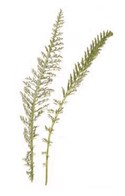
Yarrow
Introduction
This fact sheet provides basic information about Yarrow. Yarrow is native to Europe and Asia and has been naturalized in North America. Its use in food and medicine is ancient, dating back to the Trojan War, around 1200 BC. In legend, Achilles used it on the Centaur's advice, hence the name. In classical times, yarrow was referred to as "herba militaris" because it stopped bleeding wounds received in war. Yarrow leaves have been used for tea, and young leaves and flowers have been used in salads. Infusions of yarrow have served as cosmetic cleansers and medicines. Sneezewort leaves ( A. ptarmica ) have been used in sneezing powder, while those of A. millefolium have been used for snuff. Yarrow has been used therapeutically as a "strengthening bitter tonic" and astringent. Chewing fresh leaves has been suggested to relieve toothaches. Yarrow oil has been used in shampoos for a topical "healing" effect.
Common Names
Yarrow, Thousand-Leaf, Mil Foil, Green Arrow, Wound Wort, Nosebleed Plant
Latin Names
Achillea millefolium
What It Is Used For
- Research reveals no clinical data regarding the use of yarrow to treat any condition. However, yarrow has been used to induce sweating and to stop wound bleeding. It has also been reported to reduce heavy menstrual bleeding and pain. It has been used to relieve GI ailments, for cerebral and coronary thromboses, to lower high blood pressure, to improve circulation, and to tone varicose veins. It has antimicrobial actions, is a natural source for food flavoring, and is used in alcoholic beverages and bitters.
How It Is Used
The following are recommended adult doses for yarrow:
- Dried herb: 2 to 4 g in infusion or capsules three times a day
- Extract (1:1, 25 ethanol): 1 to 4 mL three times a day
- Tincture (1:5; 40 ethanol): 2 to 4 mL three times a day
- Yarrow flowers, or equivalent preparations: 3 g a day as infusion or tea
- There are no modern clinical studies to validate.
What the Science Says
- Research reveals no clinical data regarding the use of yarrow for any condition.
Side Effects and Cautions
- Avoid use of yarrow's volatile oil during pregnancy.
Sources







